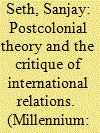|
|
|
Sort Order |
|
|
|
Items / Page
|
|
|
|
|
|
|
| Srl | Item |
| 1 |
ID:
116879


|
|
|
|
|
| Publication |
2012.
|
| Summary/Abstract |
This essay revisits Marshall Berman's extremely influential book, All that is Solid Melts into Air, some thirty years after its first publication. Berman provided an analysis of modernity as something including, but not limited to, capitalism, and as something which encompassed not just `social processes' but also new subjectivities, not just new world(s) but new ways of inhabiting them. He also offered a passionate defense of modernity an its possibilities, and of modernism as a mode of engaging and affirming these possibilities. In asking how well this analysis reads 30 years later, this essay provides a sympathetic critique, in the course of which it provides elements of an alternative, postcolonial reading of modernity.
|
|
|
|
|
|
|
|
|
|
|
|
|
|
|
|
| 2 |
ID:
124452


|
|
|
|
|
| Publication |
2013.
|
| Summary/Abstract |
This article asks a series of very direct, if not simple, questions. How, and why, is it that we assume that modern knowledge is universal, despite its European genealogy and its historically recent provenance? What warrant do we have for considering this knowledge superior to the premodern knowledges of the West and the autochthonous knowledges of the non-West? Are we, in short, right to assume that modern Western knowledge transcends the circumstances of its historical and geographical emergence and thus that the social sciences are "true" for everyone-even though to do so is to privilege the modern and the Western over the premodern and the non-Western? In addressing these questions, this essay highlights the exclusions-of gods and spirits, and of nature-that have gone into the constitution of the concept of "the social," a taken-for-granted object which provides the ground and the subject matter for the social sciences.
|
|
|
|
|
|
|
|
|
|
|
|
|
|
|
|
| 3 |
ID:
110481


|
|
|
|
|
| Publication |
2011.
|
| Summary/Abstract |
This article in three parts offers the beginnings of a postcolonial critique of mainstream International Relations (IR). The first part argues that IR, where it has been interested in history at all, has misdescribed the origins and character of the contemporary international order, and that an accurate understanding of the 'expansion of the international system' requires attention to its colonial origins. The second part suggests that IR is deeply Eurocentric, not only in its historical account of the emergence of the modern international order, but also in its account(s) of the nature and functioning of this order. The human sciences are heirs to a tradition of knowledge which defines knowledge as a relation between a cognising, representing subject and an object, such that knowledge is always 'of' something out there, which exists independently of its apprehension. The third part of the article suggests that knowledges serve to constitute that which they purport to merely cognise or represent, and that IR theory serves to naturalise that which is historically produced.
|
|
|
|
|
|
|
|
|
|
|
|
|
|
|
|
|
|
|
|
|